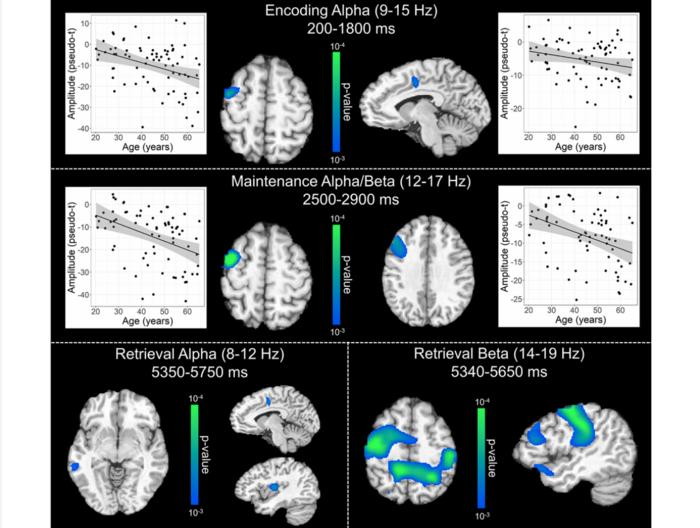“[…] we discuss the implications of these novel findings on our understanding of how healthy aging affects verbal working memory processing.”

Credit: 2023 Springer et al.
“[…] we discuss the implications of these novel findings on our understanding of how healthy aging affects verbal working memory processing.”
BUFFALO, NY- January 2, 2024 – A new research paper was published on the cover of Aging (listed by MEDLINE/PubMed as “Aging (Albany NY)” and “Aging-US” by Web of Science) Volume 15, Issue 24, entitled, “Age-related alterations in the oscillatory dynamics serving verbal working memory processing.”
Working memory (WM) is a foundational cognitive function involving the temporary storage of information. Unfortunately, WM is also one of the most sensitive cognitive functions to the detrimental effects of aging. Expanding the field’s understanding of age-related WM changes is critical to advancing the development of strategies to mitigate age-related WM declines.
In this new study, researchers Seth D. Springer, Hannah J. Okelberry, Madelyn P. Willett, Hallie J. Johnson, Chloe E. Meehan, Mikki Schantell, Christine M. Embury, Maggie P. Rempe, and Tony W. Wilson from Boys Town National Research Hospital, University of Nebraska Medical Center, Washington University School of Medicine, and Creighton University investigated the neural mechanisms serving WM function in seventy-eight healthy aging adults (range: 20.2–65.2 years) using magnetoencephalography (MEG) and a Sternberg WM task with letter stimuli.
“We hypothesized that older adults would require stronger engagement of key left hemispheric frontal and parieto-occipital WM hubs. Additionally, we expected that prefrontal activity lateralization (i.e., stronger left hemispheric activity) during WM performance would diminish as a function of age, with older individuals tending to utilize a more bilaterally distributed WM network.”
Neural activity during the different phases of the WM task (i.e., encoding, maintenance, and retrieval) were imaged using a time-frequency resolved beamformer and whole-brain statistics were performed. The researchers found stronger increases in theta activity and stronger decreases in alpha and beta activity (i.e., more negative relative to baseline) as a function of healthy aging. Specifically, age-related increases in theta activity were detected during the encoding period in the primary visual and left prefrontal cortices. Additionally, alpha and beta oscillations were stronger (i.e., more negative) during both encoding and maintenance in the left prefrontal cortex in older individuals. Finally, alpha and beta oscillations during the retrieval phase were stronger (i.e., more negative) in older participants within the prefrontal, parietal, and temporal cortices.
“Together, these results indicate that healthy aging strongly modulates the neural oscillatory dynamics serving WM function.”
Read the full study: DOI: https://doi.org/10.18632/aging.205403
Corresponding Author: Tony W. Wilson – [email protected]
Keywords: oscillation, magnetoencephalography, MEG, theta, alpha, aging
Sign up for free Altmetric alerts about this article: https://aging.altmetric.com/details/email_updates?id=10.18632%2Faging.205403
About Aging:
Launched in 2009, Aging (Aging-US) publishes papers of general interest and biological significance in all fields of aging research and age-related diseases, including cancer—and now, with a special focus on COVID-19 vulnerability as an age-dependent syndrome. Topics in Aging go beyond traditional gerontology, including, but not limited to, cellular and molecular biology, human age-related diseases, pathology in model organisms, signal transduction pathways (e.g., p53, sirtuins, and PI-3K/AKT/mTOR, among others), and approaches to modulating these signaling pathways.
Please visit our website at www.Aging-US.com and connect with us:
- SoundCloud
- X, formerly known as Twitter
- YouTube
- LabTube
Click here to subscribe to Aging publication updates.
For media inquiries, please contact [email protected].
Aging (Aging-US) Journal Office
6666 E. Quaker Str., Suite 1B
Orchard Park, NY 14127
Phone: 1-800-922-0957, option 1
###
Journal
Aging-US
DOI
10.18632/aging.205403
Method of Research
Observational study
Subject of Research
People
Article Title
Age-related alterations in the oscillatory dynamics serving verbal working memory processing
Article Publication Date
27-Dec-2023




